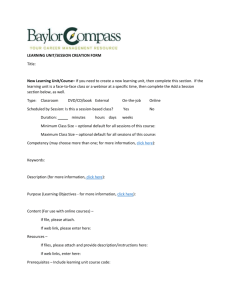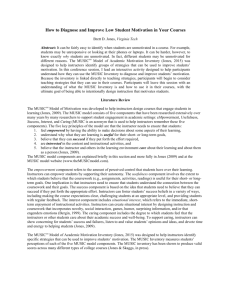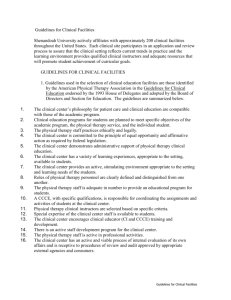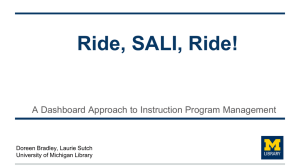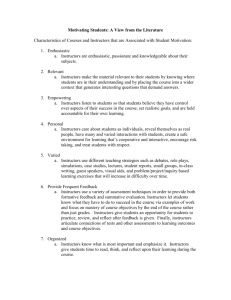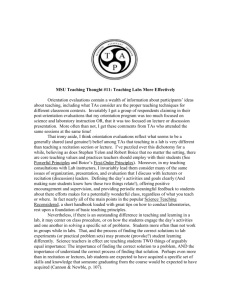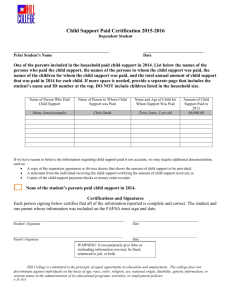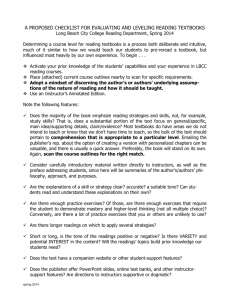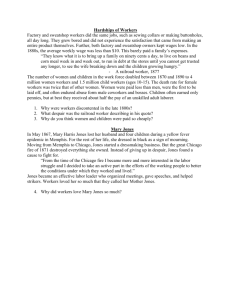How to Motivate Students in Online Courses
advertisement
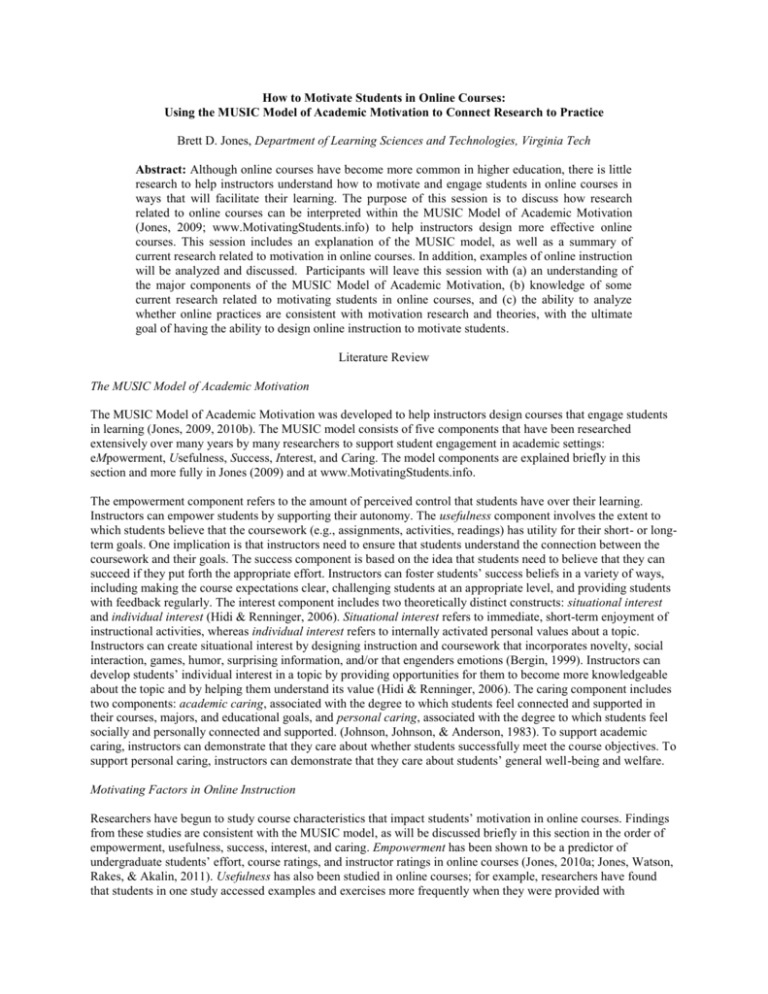
How to Motivate Students in Online Courses: Using the MUSIC Model of Academic Motivation to Connect Research to Practice Brett D. Jones, Department of Learning Sciences and Technologies, Virginia Tech Abstract: Although online courses have become more common in higher education, there is little research to help instructors understand how to motivate and engage students in online courses in ways that will facilitate their learning. The purpose of this session is to discuss how research related to online courses can be interpreted within the MUSIC Model of Academic Motivation (Jones, 2009; www.MotivatingStudents.info) to help instructors design more effective online courses. This session includes an explanation of the MUSIC model, as well as a summary of current research related to motivation in online courses. In addition, examples of online instruction will be analyzed and discussed. Participants will leave this session with (a) an understanding of the major components of the MUSIC Model of Academic Motivation, (b) knowledge of some current research related to motivating students in online courses, and (c) the ability to analyze whether online practices are consistent with motivation research and theories, with the ultimate goal of having the ability to design online instruction to motivate students. Literature Review The MUSIC Model of Academic Motivation The MUSIC Model of Academic Motivation was developed to help instructors design courses that engage students in learning (Jones, 2009, 2010b). The MUSIC model consists of five components that have been researched extensively over many years by many researchers to support student engagement in academic settings: eMpowerment, Usefulness, Success, Interest, and Caring. The model components are explained briefly in this section and more fully in Jones (2009) and at www.MotivatingStudents.info. The empowerment component refers to the amount of perceived control that students have over their learning. Instructors can empower students by supporting their autonomy. The usefulness component involves the extent to which students believe that the coursework (e.g., assignments, activities, readings) has utility for their short- or longterm goals. One implication is that instructors need to ensure that students understand the connection between the coursework and their goals. The success component is based on the idea that students need to believe that they can succeed if they put forth the appropriate effort. Instructors can foster students’ success beliefs in a variety of ways, including making the course expectations clear, challenging students at an appropriate level, and providing students with feedback regularly. The interest component includes two theoretically distinct constructs: situational interest and individual interest (Hidi & Renninger, 2006). Situational interest refers to immediate, short-term enjoyment of instructional activities, whereas individual interest refers to internally activated personal values about a topic. Instructors can create situational interest by designing instruction and coursework that incorporates novelty, social interaction, games, humor, surprising information, and/or that engenders emotions (Bergin, 1999). Instructors can develop students’ individual interest in a topic by providing opportunities for them to become more knowledgeable about the topic and by helping them understand its value (Hidi & Renninger, 2006). The caring component includes two components: academic caring, associated with the degree to which students feel connected and supported in their courses, majors, and educational goals, and personal caring, associated with the degree to which students feel socially and personally connected and supported. (Johnson, Johnson, & Anderson, 1983). To support academic caring, instructors can demonstrate that they care about whether students successfully meet the course objectives. To support personal caring, instructors can demonstrate that they care about students’ general well-being and welfare. Motivating Factors in Online Instruction Researchers have begun to study course characteristics that impact students’ motivation in online courses. Findings from these studies are consistent with the MUSIC model, as will be discussed briefly in this section in the order of empowerment, usefulness, success, interest, and caring. Empowerment has been shown to be a predictor of undergraduate students’ effort, course ratings, and instructor ratings in online courses (Jones, 2010a; Jones, Watson, Rakes, & Akalin, 2011). Usefulness has also been studied in online courses; for example, researchers have found that students in one study accessed examples and exercises more frequently when they were provided with information about the usefulness of the material (Sansone, Fraughton, Zachary, Butner, & Heiner, 2011). Other studies of undergraduate and graduate students have also documented that when instructors make the course content more useful and relevant to students’ interests, students’ motivation increases (Kim & Frick, 2011). Students’ perceptions of their ability to succeed in using technology have also been shown to be related to their motivation (Kim & Frick, 2011). Further, different uses of technology, such as podcasts can be one way to increase students’ situational interest in the material (Bolliger, Supanakorn, & Boggs, 2010). Finally, online instructors’ caring, as demonstrated through their online presence and the immediacy of feedback that they provide, has also been documented to be motivating to students (Baker, 2010; Jones et al., 2011). Goals and Objectives Participants who pay attention during the session will leave with: an understanding of the major components of the MUSIC Model of Academic Motivation, knowledge of some current research related to motivating students in online courses, and the ability to analyze whether online practices are consistent with motivation research and theories, with the ultimate goal of having the ability to design online instruction to motivate students. Description of Practice The session will be organized in the following order: 10 minutes – I will begin the session with an explanation of the MUSIC model to ensure that participants understand the basic tenets of the model. 10 minutes – I will briefly discuss some key findings from researchers who have studied motivation in online courses and use these findings as examples of how the MUSIC model can be used to design and diagnose online instruction. 25 minutes – I will show real-world examples from online courses and ask participants to work in groups to analyze whether the examples would promote students’ motivation based on motivation research and theories. 5 minutes – I will answer final questions from participants. References Baker, C. (2010). The Impact of Instructor Immediacy and Presence for Online Student Affective Learning, Cognition, and Motivation. Journal of Educators Online, 7(1). Bergin, D. A. (1999). Influences on classroom interest. Educational Psychologist, 34, 87-98. Bolliger, D. U., Supanakorn, S., & Boggs, C. (2010). Impact of podcasting on student motivation in the online learning environment. Computers & Education, 55(2), 714-722. Hidi, S., & Renninger, K. A. (2006). The four-phase model of interest development. Educational Psychologist, 41(2), 111-127. Johnson, D. W., Johnson, R. & Anderson, A. (1983). Social interdependence and classroom climate. Journal of Psychology, 114(1), 135-142. Jones, B. D. (2009). Motivating students to engage in learning: The MUSIC Model of Academic Motivation. International Journal of Teaching and Learning in Higher Education, 21(2), 272-285. Jones, B. D. (2010a). An examination of motivation model components in face-to-face and online instruction. Electronic Journal of Research in Educational Psychology, 8(3), 915-944. Jones, B. D. (2010b, October). Strategies to implement a motivation model and increase student engagement. Paper presented at the annual meeting of the International Society for Exploring Teaching and Learning, Nashville, TN. Retrieved from http://www.MotivatingStudents.info Jones, B. D., Watson, J. M., Rakes, L., & Akalin, S. (2011). Motivating students in an online Personal Health course. Manuscript in preparation. Kim, K., & Frick, T. W. (2011). Changes in student motivation during online learning. Journal of Educational Computing Research, 44(1), 1-23. Sansone, C., Fraughton, T., Zachary, J. L., Butner, J., & Heiner, C. (2011). Self-regulation of motivation when learning online: The importance of who, why and how. Educational Technology Research and Development, 59(2), 199-212.
